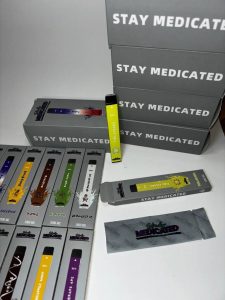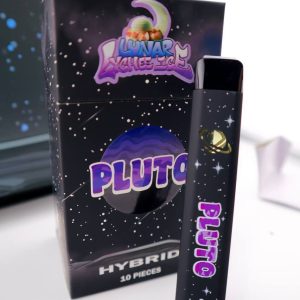Strictly Medicated 1G Disposable
$30.00 $25.00
Strictly Medicated Disposable
Introduction to Strictly Medicated Disposables
In the evolving landscape of healthcare and consumer goods, the concept of strictly medicated disposable items represents a significant innovation. This term likely refers to products that are infused with specific medications and designed for one-time use, ensuring precise dosages and minimizing risks of contamination or misuse. The strict regulation implied by “strictly medicated” suggests a high level of oversight and control, crucial for products that directly impact health and safety.

Applications and Use Cases
1.Healthcare and Medical Devices:
Single-Use Syringes and Injectors: One of the most common applications of strictly medicated disposables is in the form of pre-filled syringes and auto-injectors. These devices are designed for single use, pre-loaded with a specific dose of medication, such as insulin, epinephrine, or vaccines. This ensures accurate dosing and sterility, reducing the risk of infections and dosage errors.
Medicated Bandages and Patches: Another significant application includes medicated bandages and patches, which are impregnated with therapeutic agents like pain relievers, antibiotics, or anti-inflammatory drugs. These disposables provide localized treatment directly to the affected area, offering a convenient and hygienic solution.
2.Pharmaceutical and Consumer Health Products:
Medicated Wipes and Tissues: In the realm of consumer health, strictly medicated disposable products can include medicated wipes or tissues. These are often used for antiseptic purposes, wound care, or even skincare, providing precise applications of medications like antiseptics or acne treatments.
Single-Dose Eye Drops and Nasal Sprays: Disposable, single-use containers of eye drops or nasal sprays ensure that users receive the correct dose without the risk of cross-contamination. This is particularly important for medications treating infections or allergies, where hygiene is critical.
Benefits of Strictly Medicated Disposables
The rise of strictly medicated disposable products offers several distinct advantages:
1.Enhanced Safety and Hygiene:
Preventing Contamination: The single-use nature of these products significantly reduces the risk of contamination. In medical settings, this is crucial for preventing hospital-acquired infections and ensuring patient safety.
Accurate Dosing: Pre-measured doses eliminate the risk of administering too much or too little medication, which is particularly important for potent drugs where dosage precision is critical.
2.Convenience and Accessibility:
Ease of Use: Strictly medicated disposables are designed for ease of use, often requiring minimal preparation or handling. This makes them ideal for both healthcare professionals and patients, particularly those with limited dexterity or experience.
Portability: These products are often lightweight and compact, making them easy to transport and use on the go. This is beneficial for patients who require medication while traveling or in emergency situations.
3.Regulatory Compliance and Quality Assurance:
Strict Oversight: The strictly medicated aspect implies stringent regulatory standards, ensuring that these products meet high safety and efficacy standards. This gives healthcare providers and patients confidence in the quality and reliability of the products.
Batch Consistency: By controlling the manufacturing process and dosage, strictly medicated disposables ensure consistency across batches, which is critical for maintaining therapeutic effectiveness.

Challenges and Considerations
Despite the benefits, strictly medicated disposables also present several challenges that must be addressed:
1.Environmental Impact:
Waste Generation: The disposable nature of these products leads to significant waste, contributing to environmental concerns. As these items are often made from plastics and other non-biodegradable materials, their disposal poses a challenge.
Sustainable Alternatives: There is an increasing need for the development of eco-friendly materials and recycling programs to mitigate the environmental impact. Biodegradable materials or take-back programs could be explored as potential solutions.
2.Cost Considerations:
Higher Costs: Strictly medicated disposables can be more expensive than reusable alternatives, both in terms of manufacturing and purchasing costs. This may limit their accessibility, particularly in low-income regions or for patients without adequate insurance coverage.
Healthcare Expenditure: The widespread use of these products can increase healthcare costs, necessitating careful consideration of their cost-effectiveness and value in medical practice.
3.Regulatory and Safety Issues:
Regulatory Compliance: Strict regulatory oversight is necessary to ensure these products meet safety and efficacy standards. This includes rigorous testing and certification processes, which can be time-consuming and costly.
Risk of Misuse: Despite their benefits, there is a risk that patients may misuse strictly medicated disposables, particularly if they misunderstand dosage instructions or use them inappropriately. Clear labeling and patient education are essential to mitigate this risk.
Market Trends and Consumer Perspectives
The market for strictly medicated disposables is growing, driven by several key trends and consumer demands:
1.Rising Demand for Home Healthcare:
Self-Administration of Medication: With an increasing number of patients managing chronic conditions at home, there is a growing demand for products that are easy to use and safe for self-administration. Strictly medicated disposables meet this need by providing pre-measured, ready-to-use medications.
Aging Population: As the global population ages, there is an increasing need for convenient, accessible healthcare solutions. Older adults often require multiple medications and may benefit from the simplicity and safety of disposable products.
2.Technological Innovations:
Advanced Drug Delivery Systems: Innovations in drug delivery technologies are driving the development of new strictly medicated disposable products. These include advanced materials for patches and bandages, smart packaging that tracks usage, and novel formulations that enhance drug stability and efficacy.
Personalization and Customization: The trend towards personalized medicine is also influencing the market. Strictly medicated disposables can be customized to deliver specific doses tailored to individual patient needs, enhancing treatment outcomes.
3.Consumer Awareness and Preferences:
Focus on Hygiene and Safety: In the wake of global health crises such as the COVID-19 pandemic, there is heightened awareness of hygiene and safety. Consumers are increasingly seeking products that offer protection against infections, driving demand for strictly medicated disposables.
Preference for Convenience: Modern consumers value convenience and efficiency. Strictly medicated disposables cater to this preference by providing easy-to-use, portable solutions that integrate seamlessly into busy lifestyles.

Ethical and Social Implications
The development and use of strictly medicated disposables also raise important ethical and social questions:
1.Access and Equity:
Healthcare Inequities: While these products offer significant benefits, their higher costs may exacerbate healthcare inequities, limiting access for disadvantaged populations. Ensuring equitable access to these advanced healthcare products is a crucial consideration.
Global Disparities: There is also a concern that the benefits of strictly medicated disposables may not be equally accessible worldwide, particularly in low- and middle-income countries. Addressing these disparities through policies, subsidies, and international aid is vital.
2.Patient Autonomy and Informed Consent:
Informed Usage: Ensuring that patients understand how to use strictly medicated disposables correctly is essential. This involves clear communication from healthcare providers and accessible, comprehensive labeling and instructions.
Ethical Marketing: Companies must market these products ethically, avoiding misleading claims and ensuring that patients have accurate information about the benefits and limitations of strictly medicated disposables.
3.Environmental Responsibility:
Sustainable Practices: Companies producing strictly medicated disposables have a responsibility to minimize environmental impact. This includes investing in research and development for sustainable materials, implementing recycling programs, and educating consumers about proper disposal.
Conclusion
The concept of strictly medicated disposable products represents a significant advancement in both healthcare and consumer goods, offering unique benefits in terms of safety, convenience, and precision. These products play a critical role in modern healthcare, from managing chronic conditions to providing emergency treatment.
However, the widespread adoption of strictly medicated disposables also brings challenges, including environmental concerns, cost considerations, and the need for stringent regulatory oversight. Addressing these challenges requires a multi-faceted approach, involving innovation in sustainable materials, equitable access policies, and comprehensive patient education.
As the market continues to grow, it will be important for stakeholders, including manufacturers, healthcare providers, regulators, and consumers, to work together to maximize the benefits of strictly medicated disposables while mitigating potential drawbacks. This will ensure that these products can fulfill their potential to improve health outcomes and quality of life, making healthcare more efficient, accessible, and safe for all.
In summary, strictly medicated disposables are more than just a convenience; they represent a critical tool in the modern healthcare toolkit. Their development and use are a testament to the ongoing evolution of medical technology and the increasing emphasis on patient-centered care. As we move forward, the focus should be on innovation, sustainability, and accessibility, ensuring that the benefits of these products are available to all who need them, while also protecting our environment and promoting ethical practices in healthcare.
| FLAVORS | JUICY FRUIT, STRICTLY BLUE, GUSHERS, BLUE BURST, GIRL SCOUT COOKIES, OREOS, GREEN CRACK, WATERMELON, STRAWBERRY COUGH, DIABLO OG, AK-47, GALACTIC PUNCH, MARATHON OG, OUTER SPACE SAUCE, PINA COLADA, GRAPE APE, CHERRY PIE, HOOD TROPHY, PARKSIDE PEACH, BLUE RAZZ, GODS GIFT, CREME BRULEE, BIRTHDAY CAKE, ORIGINAL Z |
|---|
Be the first to review “Strictly Medicated 1G Disposable” Cancel reply
Related products
BULK ORDERS
THC DISPOSABLE VAPE
BULK ORDERS
BULK ORDERS
THC DISPOSABLE VAPE
BULK ORDERS
THC DISPOSABLE VAPE
THC DISPOSABLE VAPE



























Reviews
There are no reviews yet.